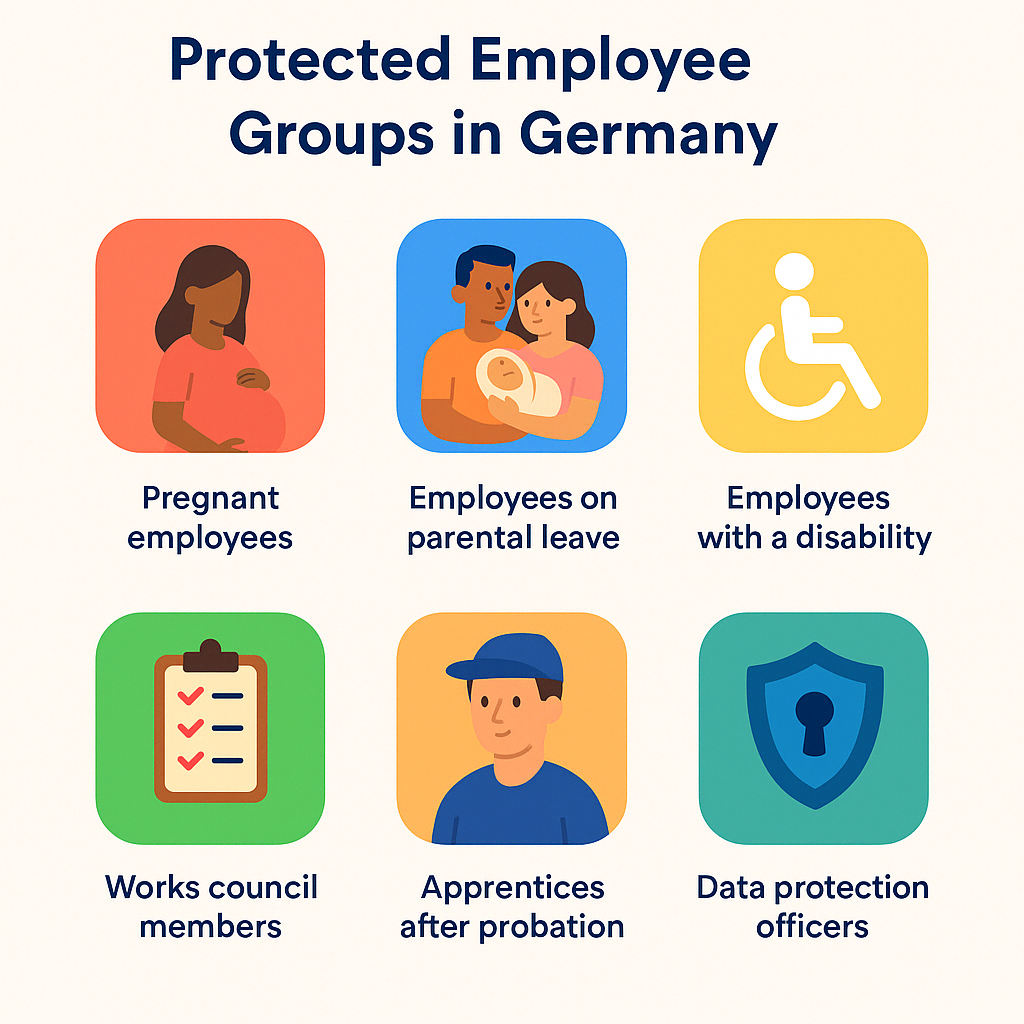
German labor law provides one of the strongest dismissal protection systems in Europe. In addition to general protection for most employees, there are strict rules offering special protection against dismissal to certain vulnerable or strategically important groups.
This includes pregnant employees, people with disabilities, parents on parental leave, employee representatives, and others. Employers must follow special procedures and in many cases obtain official approval before issuing a termination.
This guide outlines who qualifies for special protection against dismissal in Germany, how the legal framework works, and what expats need to know if they belong to a protected category.
Content
- 1. What Is Special Protection Against Dismissal?
- 2. Who Is Covered by Special Protection?
- 3. Pregnancy and Maternity Leave
- 4. Parental Leave
- 5. Employees with Severe Disabilities
- 6. Works Council Members and Other Employee Representatives
- 7. Apprentices and Trainees
- 8. Other Protected Roles
- 9. What Happens If an Employer Ignores Protection?
- 10. Can Special Protection Be Waived?
- Conclusion
1. What Is Special Protection Against Dismissal?
Special protection against dismissal refers to additional legal safeguards provided to specific groups of employees beyond the general dismissal rules.
In most cases, this means:
- Employers cannot terminate the employee without prior approval from a government authority
- Dismissals during the protection period are invalid without consent
- The employee cannot waive this protection in advance
The purpose is to protect individuals in socially or legally sensitive situations from losing their job unfairly or without oversight.
2. Who Is Covered by Special Protection?
The following categories of employees are entitled to special protection against dismissal in Germany:
| Protected Group | Legal Basis |
|---|---|
| Pregnant employees and those on maternity leave | Maternity Protection Act (Mutterschutzgesetz) |
| Employees on parental leave | Federal Parental Benefit and Leave Act (BEEG) |
| Employees with a recognized disability | Social Code Book IX (SGB IX) |
| Works council members | Works Constitution Act (Betriebsverfassungsgesetz) |
| Data protection officers, company officers | Special statutory roles |
| Apprentices after probation period | Vocational Training Act (BBiG) |
| Employees during military/civic service | Civil Protection Law |
📌 The protection usually applies during employment and in some cases continues after the protected event (e.g. post-maternity period).

3. Pregnancy and Maternity Leave
Employees are protected from dismissal:
- From the beginning of pregnancy until 4 months after childbirth
- During statutory maternity leave, usually 6 weeks before and 8 weeks after birth
- Even if the employer is unaware of the pregnancy at first (retroactive protection)
An employer may only terminate employment with:
- Prior written approval from the State Labor Authority (Aufsichtsbehörde)
- Valid, exceptional reasons (e.g. business closure)
Without this approval, the termination is automatically void.
4. Parental Leave
Employees on parental leave (Elternzeit) enjoy dismissal protection from:
- The date the leave is formally requested
- Until the end of the approved leave period (up to 3 years)
Dismissal during this time requires:
- Exceptional justification
- Approval from the competent state authority
- Consideration of social and family interests
📌 Parental leave must be applied for in writing no later than 7 weeks before it begins to trigger protection.
5. Employees with Severe Disabilities
Employees with officially recognized disabilities (degree of 50% or more) are entitled to special protection under German disability law.
Key points:
- Employer must obtain prior consent from the Integration Office (Integrationsamt)
- Applies to both ordinary and extraordinary termination
- Protection exists after 6 months of employment
- Employees with 30–49% disability may also qualify upon request
Dismissal without the Integration Office’s consent is invalid, even if the employer was unaware of the disability.
6. Works Council Members and Other Employee Representatives
Members of the works council (Betriebsrat) and other elected employee representatives cannot be terminated:
- During their term of office
- For one year after their mandate ends
Ordinary dismissal is entirely prohibited unless the works council consents or a court permits it. Extraordinary dismissal requires:
- Serious cause
- Approval by the entire works council
- Court confirmation if contested
📌 This protection ensures that employee representatives can carry out their duties without fear of retaliation.
7. Apprentices and Trainees
After the probationary period, apprentices (Azubis) may not be terminated before the end of their training contract without serious cause.
Employers may only:
- Terminate with immediate effect for misconduct
- Do so with written justification
Ordinary termination is not permitted unless mutually agreed in writing.
8. Other Protected Roles
Several specific positions enjoy similar protection:
- Data protection officers
- Company safety officers
- Employees during military or civil protection service
- Equal opportunity officers (Gleichstellungsbeauftragte) in public sector roles
Dismissal of these individuals may require:
- Approval by external authorities
- Additional justification and legal oversight
9. What Happens If an Employer Ignores Protection?
A dismissal issued without required approval is:
- Legally invalid, even if the reason is justified
- Subject to reversal by the labor court if challenged
- May entitle the employee to reinstatement or compensation
In some cases, employers may be fined or exposed to damages claims.
Employees can take legal action by filing an unfair dismissal claim (Kündigungsschutzklage) within three weeks of receiving the notice—even if they are protected.
10. Can Special Protection Be Waived?
In general:
- Special protection cannot be waived in advance
- Termination agreements may still be possible, but require voluntary consent
- Courts examine such agreements closely, especially in pregnancy or disability cases
📌 Never sign a mutual termination agreement (Aufhebungsvertrag) if you’re in a protected category without legal advice.
Conclusion
Germany’s system of special protection against dismissal plays a crucial role in protecting vulnerable employees from unjustified or opportunistic termination. Whether you are pregnant, disabled, on parental leave, or elected to a representative role—your rights are backed by law.
As an expat, understanding these protections is essential to defending your position and avoiding pressure to accept unfair termination agreements. If you believe your dismissal violates your protected status, seek legal counsel and act quickly.






